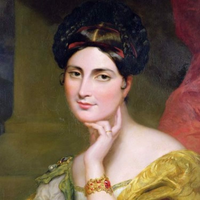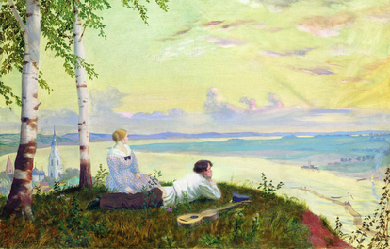The Rock of the Betrayed
I.
IT was a Highland chieftain’s son
Gazed sadly from the hill:
And they saw him shrink from the autumn wind,
As its blast came keen and chill.
II.
His stately mother saw,—and spoke
With the heartless voice of pride;
‘T is well I have a stouter son
The border wars to ride.’
III.
His jealous brother saw, and stood,
Red-hair’d, and fierce, and tall,
Muttering low words of fiendish hope
To be the lord of all.
IV.
But sickly Allan heard them not,
As he look’d o’er land and lea;
He was thinking of the sunny climes
That lie beyond the sea.
V.
He was thinking of the native land
Whose breeze he could not bear;
Whose wild free beauty he must leave,
To breathe a warmer air.
VI.
He was dreaming of his childhood’s haunts,
And his grey-hair’d father’s praise;
And the chance of death which hung so near
And darken’d his young days.
VII.
So he turn’d, and bade them both farewell,
With a calm and mournful smile;
And he spoke of dwelling far away,
But only for a while.
VIII.
And if a pang of bitter grief
Shot wildly through his heart,
No man heard Allan Douglas sigh,
Nor saw the tear-drop start:
IX.
For he left in Scotland none who cared
If e’er he should return,
In castle hall, or cottage low,
By river or by burn.
X.
Only upon the heather brae
His quivering lip he press’d;
And clasp’d the senseless birchen tree,
And strain’d it to his breast;
XI.
Because the human heart is full
Of love that must be given,
However check’d, estranged, and chill’d,
To something under Heaven.
XII.
And these things had been friends to him
Thro’ a life of lonely hours—
The blue lake, and the waving birch,
And the low broom’s scented flowers.
XIII.
Twice had the snow been on the hills,
And twice the soft spring rain,
When Allan Douglas bent his way
To his native land again.
XIV.
More healthful glow’d his hollow cheek,
His step was firm and free,
And he brought a fair Italian girl
His bonny bride to be.
XV.
But darkly sneer’d his brother cold,
When he saw that maiden fair,
'Is a foreign minion come to wed
The Highland chieftain’s heir?'
XVI.
And darkly gloom’d the mother’s brow
As she said, ‘Am I so old,
That a stranger must so soon come here
The castle keys to hold?’
XVII.
Then spoke the young Italian girl
With a sweet and modest grace,
As she lifted upi her soft black eyes
And look’d them in the face:
XVIII.
'A stranger and an orphan comes
To Allan’s native land,
And she needs the mother’s welcome smile,
And the brother’s friendly hand.
XIX.
'Be thine! oh, stately lady—thine—
The rule that thou dost crave,
For Allan’s love is all I earn’d,
And all I seek to have.
XX.
'And trust me, brother, tho’ my words
In foreign accents fall,
The heart is of no country born,
And my heart will love you all.'
XXI.
But vain the music of her tongue
Against the hate they bore;
And when a babe her love had bless’d
They hated her the more.
XXII.
They hated her the more because
That babe must be the heir,
And his dark and lovely eyes at times
His mother’s look would wear.
XXIII.
But lo! the keen cold winter came
With many a bitter blast:
It pierced thro’ sickly Allan’s frame,—
He droop’d and died at last!
XXIV.
Oh! mournfully at early morn
That young wife sat and wept,—
And mournfully, when day was done,
To her widow’d couch she crept,—
XXV.
And mournfully at noon she rock’d
The baby on her knee;
‘There is no pity in their hearts,
My child, for thee and me.
XXVI.
’There was no pity in their hearts
For him who is at rest:
How should they feel for his young son
Who slumbers at my breast?'
XXVII.
The red-hair’d brother saw her tears,
And said, ‘Nay, cease thy moan—
Come forth into the morning air,
And weep. no more alone!’
XXVIII.
The proud stepmother chid her woe;—
'Even for thy infant’s sake
Go forth into the morning air,
And sail upon the lake!'
XXIX.
There seem’d some feeling for her state;
Their words were fair and mild;
Yet she shudder’d as she whisper’d low,
‘God shield me and my child!’
XXX.
‘Come!’ said dead Allan’s brother stern,
‘Why dost thou tremble so?
’Come!'—and with doubt and fear perplex’d,
The lady rose to go.
XXXI.
They glided over the glassy lake,
'Till its lulling murmur smote,
With a death-like omen, to and fro’,
Against the heaving boat.
XXXII.
And no one spoke;—that brother still
His face averted kept,
And the lady’s tears fell fast and free
O’er her infant as it slept.
XXXIII.
The cold faint evening breeze sprang up
And found them floating on;
They glided o’er the glassy lake
Till the day’s last streak was gone—
XXXIV.
Till the day’s last streak had died away
From the chill and purple strand,
And a mist was on the water’s face
And a damp dew on the land;
XXXV.
Till you could not trace the living hue
Of lip, or cheek, or eye,
But the outline of each countenance
Drawn dark against the sky.
XXXVI.
And all things had a ghastly look,
An aspect strange and drear;—
The lady look’d to the distant shore
And her heart beat wild with fear.
XXXVII.
There is a rock whose jutting height
Stands frowning o’er that lake,
Where the faintest call of the bugle horn
The echo’s voice will wake:—
XXXVIII.
And there the water lifts no wave
To the breeze, so fresh and cool,
But lies within the dark rock’s curve,
Like a black and gloomy pool.
XXXIX.
Its depth is great,—a stone thrown in
Hath a dull descending sound,
The plummet hath not there been cast
Which resting-place hath found.
XL.
And scatter’d firs and birch-trees grow
On the summit, here and there—
Lonely and joylessly they wave,
Like an old man’s thin grey hair.
XLI.
But not to nature’s hand it owes
Its mournfulness alone,
For vague tradition gives the spot
A horror of its own.
XLII.
The boatman doffs his cap beneath
Its dark o’er-hanging shade,
And whispers low its Gaelic name,—
'THE ROCK OF THF BETRAY’D.'
XLIII.
And when the wind, which never curls
That pool, goes sweeping by,
Bending the firs and birchen trees
With a low and moaning sigh,—
XLIV.
He’ll tell you that the sound which comes
So strange, and faint, and dim,
Is only heard at one set hour,
And call’d 'THE LADY’S HYMN.'


